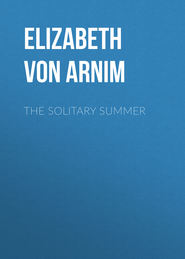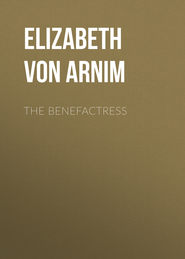По всем вопросам обращайтесь на: info@litportal.ru
(©) 2003-2024.
✖
The Adventures of Elizabeth in Rügen
Настройки чтения
Размер шрифта
Высота строк
Поля
'That is what I have been wondering ever since I found him,' I said.
'He was wounded in some battle and was trying to get home,' said Brosy. 'You know Finland was Swedish in those days, and so was Rügen.'
As I did not know I said nothing, but looked exceedingly bright.
'He had been fighting for Sweden against the French. I met a forester yesterday, and he told me there used to be a forester's house where those fruit trees are, and the people in it took him in and nursed him till he died. Then they buried him here.'
'But why was he not buried in a churchyard?' asked his mother.
'I don't know. Poor chap, I don't suppose he would have cared. The great point I should say under such circumstances would be the being dead.'
'My dear Brosy,' murmured his mother; which was what she always murmured when he said things that she disapproved without quite knowing why.
'Or a still greater point,' I remarked, moved again to cheerful speech by the excellent tea Brosy had made, and his mother, justly suspicious of the tea of Teutons, had smuggled through the customs, as she afterwards told me with pride,—'a still greater point if those are the circumstances that lie in wait for one, would be the never being born.'
'Oh but that is pessimism!' cried Mrs. Harvey-Browne, shaking a finger at me. 'What have you, of all people in the world, to do with pessimism?'
'Oh I don't know—I suppose I have my days, like everybody else,' I said, slightly puzzled again by this remark. 'Once I was told of two aged Germans,' I continued, for by this time I had had three rusks and was feeling very pleasant,—'of two aged Germans whose digestive machinery was fragile.'
'Oh, poor things,' said Mrs. Harvey-Browne sympathetically.
'And in spite of that they drank beer all their lives persistently and excessively.'
'How very injudicious,' said Mrs. Harvey-Browne.
'They drank such a fearful lot and for so long that at last they became philosophers.'
'My dear Frau X.,' said Mrs. Harvey-Browne incredulously, 'what an unexpected result.'
'Oh but indeed there is hardly anything you may not at last become,' I insisted, 'if besides being German your diet is indiscreet enough.'
'Yes, I quite think that,' said Mrs. Harvey-Browne.
'Well, and what happened?' asked Brosy with smiling eyes.
'Well, they were naturally profoundly pessimistic, both of them. You are, you know, if your diet–'
'Oh yes, yes indeed,' agreed Mrs. Harvey-Browne, with the conviction of one who has been through it.
'They were absolutely sick of things. They loathed everything anybody said or did. And they were disciples of Nietzsche.'
'Was that the cause or the effect of the excessive beer-drinking?' asked Brosy.
'Oh, I can't endure Nietzsche,' cried Mrs. Harvey-Browne. 'Don't ever read him, Brosy. I saw some things he says about women—he is too dreadful.'
'And one said to the other over their despairing potations: "Only those can be considered truly happy who are destined never to be born."'
'There!' cried Mrs. Harvey-Browne. 'That is Nietzsche all over—rank pessimism.'
'I never heard ranker,' said Brosy smiling.
'And the other thought it over, and then said drearily: "But to how few falls that happy lot."'
There was a pause. Brosy was laughing behind his teacup. His mother, on the contrary, looked solemn, and gazed at me thoughtfully. 'There is a great want of simple faith about Germans,' she said. 'The bishop thinks it so sad. A story like that would quite upset him. He has been very anxious lest Brosy—our only child, dear Frau X., so you may imagine how precious—should become tainted by it.'
'I dislike beer,' said Brosy.
'That man this morning, for instance—did you ever hear anything like it? He was just the type of man, quite apart from his insolence, that most grieves the bishop.'
'Really?' I said; and wondered respectfully at the amount of grieving the bishop got through.
'An educated man, I suppose—did he not say he was a schoolmaster? A teacher of the young, without a vestige himself of the simple faith he ought to inculcate. For if he had had a vestige, would it not have prevented his launching into an irreverent conversation with a lady who was not only a stranger, but the wife of a prelate of the Church of England?'
'He couldn't know that, mother,' said Brosy; 'and from what you told me it wasn't a conversation he launched into but a monologue. And I must beg your pardon,' he added, turning to me with a smile, 'for the absurd mistake we made. It was the guide's fault.'
'Oh yes, my dear Frau X., you must forgive me—it was really too silly of me—I might have known—I was completely taken aback, I assure you, but the guide was so very positive–' And there followed such a number of apologies that again I was bewildered, only retaining the one clear impression that the bishop's wife desired exceedingly to be agreeable.
Well, a woman bent on being agreeable is better than a woman bent on being disagreeable, though, being the soul of caution in my statements, I must add, Not always; for I suppose few of us have walked any distance along the path of life without having had to go at least some part of the way in the company of persons who, filled with the praiseworthy wish to be very pleasant, succeeded only in drenching our spirits with the depressing torrents of effusion. And effusiveness applied to myself has precisely the effect of a finger applied to the horns of a snail who shall be innocently airing himself in the sun: he gets back without more ado into his shell, and so do I.
That is what happened on this occasion. For some reason, which I could only faintly guess, the bishop's wife after disapproving of me in the morning was petting me in the afternoon. She had been lunching, she told me, with Charlotte, and they had had a nice talk, she said, about me. About me? Instantly I scrambled back into my shell. There is surely nothing in the world so tiresome as being questioned, as I now was, on one's household arrangements and personal habits. I will talk about anything but that. I will talk with the courage of ignorance about all high matters, of which I know nothing. I am ready to discourse on all or any of the great Abstractions with the glibness of the shallow mind. I will listen sympathetically to descriptions of diseases suffered and operations survived, of the brilliance of sons and the beauty of daughters. I will lend an attentive ear to an enumeration of social successes and family difficulties, of woes and triumphs of every sort, including those connected with kitchens; but I will not answer questions about myself. And indeed, what is there to talk about? No one is interested in my soul, and as for my body I long ago got tired of that.
One cannot, however, eat a person's rusks without assuming a certain amount of subsequent blandness; so I did my best to behave nicely. Brosy smoked cigarettes. Whatever it was that had sent me up in his mother's estimation had apparently sent me down in his. He no longer, it seemed, looked upon me as a good specimen of the intelligent German female. I might be as eloquently silent as I liked, and it did not impress him in the least. The few remarks he made showed me that. This was grievous, for Brosy was, in person, a very charming young man, and the good opinion of charming young men is quite a nice thing to possess. Now I began to regret, now that he was merely interjectional, those earnest paragraphs in which he had talked the night before at supper and during the sunset walk on the island of Vilm. Observing him sideways and cautiously I saw that the pretty speeches his mother was making me apropos of everything and nothing were objectionable to him; and I silently agreed with him that pretty speeches are unpleasant things, especially when made by one woman to another. You can forgive a man perhaps, because in your heart in spite of all experience lurks the comfortable belief that he means what he says; but how shall you forgive a woman for mistaking you for a fool?
They persuaded me to drive with them to the place in the woods they were bound for called Kieköwer, where the view over the bay was said to be very beautiful; and when I got on to my feet I found I was so stiff that driving seemed the only thing possible. Ambrose was very kind and careful of my bodily comfort, but did not bother about me spiritually. Whenever there was a hill, and there kept on being hills, he got out and walked, leaving me wholly to his mother. But it did not matter any more, for the forest was so exquisite that way, the afternoon so serene, so mellow with lovely light, that I could not look round me without being happy. Oh blessed state, when mere quiet weather, trees and grass, sea and clouds, can make you forget that life has anything in it but rapture, can make you drink in heaven with every breath! How long will it last, this joy of living, this splendid ecstasy of the soul? I am more afraid of losing this, of losing even a little of this, of having so much as the edge of its radiance dimmed, than of parting with any other earthly possession. And I think of Wordsworth, its divine singer, who yet lost it so soon and could no longer see the splendour in the grass, the glory in the flower, and I ask myself with a sinking heart if it faded so quickly for him who saw it and sang it by God's grace to such perfection, how long, oh how long does the common soul, half blind, half dead, half dumb, keep its little, precious share?
My intention when I began this book was to write a useful Guide to Rügen, one that should point out its best parts and least uncomfortable inns to any English or American traveller whose energy lands him on its shores. With every page I write it grows more plain that I shall not fulfil that intention. What, for instance, have Charlotte and the bishop's wife of illuminating for the tourist who wants to be shown the way? As I cannot conscientiously praise the inns I will not give their names, and what is the use of that to a tourist who wishes to know where to sleep and dine? I meant to describe the Jagdschloss, and find I only repeated a ghost story. It is true I said the rolls at the inn there were hard, but the information was so deeply embedded in superfluities that no tourist will discover it in time to save him from ordering one. Still anxious to be of use, I will now tell the traveller that he must on no account miss going from Binz to Kieköwer, but that he must go there on his feet, and not allow himself to be driven over the roots and stones by the wives of bishops; and that shortly before he reaches Kieköwer (Low German for look, or peep over), he will come to four cross-roads with a sign-post in the middle, and he is to follow the one to the right, which will lead him to the Schwarze See or Black Lake, and having got there let him sit down quietly, and take out the volume of poetry he ought to have in his pocket, and bless God who made this little lovely hollow on the top of the hills, and drew it round with a girdle of forest, and filled its reedy curves with white water-lilies, and set it about with silence, and gave him eyes to see its beauty.
I am afraid I could not have heard Mrs. Harvey-Browne's questions for quite a long time, for presently I found she had sauntered round this enchanted spot to the side where Brosy was taking photographs, and I was sitting alone on the moss looking down through the trees at the lilies, and listening only to frogs. I looked down between the slender stems of some silver birches that hung over the water; every now and then a tiny gust of wind came along and rippled their clear reflections, ruffling up half of each water-lily leaf, and losing itself somewhere among the reeds. Then when it had gone, the lily leaves dropped back one after the other on to the calm water, each with a little thud. On the west side the lake ends in a reedy marsh, very froggy that afternoon, and starred with the snowy cotton flower. A peculiarly fragrant smell like exceedingly delicate Russian leather hangs round the place, or did that afternoon. It was, I suppose, the hot sun bringing out the scent of some hidden herb, and it would not always be there; but I like to think of the beautiful little lake as for ever fragrant, all the year round lying alone and sweet-smelling and enchanted, tucked away in the bosom of the solitary hills.
When the traveller has spent some time lying on the moss with his poet—and he should lie there long enough for his soul to grow as quiet and clear as the water, and the poet, I think, should be Milton—he can go back to the cross-roads, five minutes' walk over beech leaves, and so to Kieköwer, about half a mile farther on. The contrast between the Schwarze See and Kieköwer is striking. Coming from that sheltered place of suspended breath you climb up a steep hill and find yourself suddenly on the edge of high cliffs where the air is always moving and the wind blows freshly on to you across the bay. Far down below, the blue water heaves and glitters. In the distance lies the headland beyond Sassnitz, hazy in the afternoon light. The beech trees, motionless round the lake, here keep up a ceaseless rustle. You who have been so hot all day find you are growing almost too cool.
'Sie ist schön, unsere Ostsee, was?' said a hearty male voice behind us.
We were all three leaning against the wooden rail put up for our protection on the edge of the cliff. A few yards off is a shed where a waiter, battered by the sea breezes he is forced daily to endure, supplies the thirsty with beer and coffee. The hearty owner of the voice, brown with the sun, damp and jolly with exercise and beer-drinking, stood looking over Mrs. Harvey-Browne's shoulder at the view with an air of proud proprietorship, his hands in his pockets, his legs wide apart, his cap pushed well off an extremely heated brow.
He addressed this remark to Mrs. Harvey-Browne, to whom, I suppose, she being a matron of years and patent sobriety, he thought cheery remarks might safely be addressed. But if there was a thing the bishop's wife disliked it was a cheery stranger. The pedagogue that morning, so artlessly interested in her conversation with me as to forget he had not met her before, had manifestly revolted her. I myself the previous evening, though not cheery still a stranger, had been objectionable to her. How much more offensive, then, was a warm man speaking to her with a familiarity so sudden and jolly as to resemble nothing so much as a slap on the back. She, of course, took no notice of him after the first slight start and glance round, but stared out to sea with eyes grown stony.
'In England you do not see such blue water, what?' shouted the jolly man, who was plainly in the happy mood the French call déboutonné.
His wife and daughters, ladies clothed in dust-cloaks sitting at a rough wooden table with empty beer-glasses before them, laughed hilariously. The mere fact of the Harvey-Brownes being so obviously English appeared to amuse them enormously. They too were in the mood déboutonné.
Ambrose, as ready to talk as his mother to turn her back, answered for her, and assured the jolly man that he had indeed never seen such blue water in England.
This seemed to give the whole family intense delight. 'Ja, ja,' shouted the father, 'Deutschland, Deutschland, über Alles!' And he trolled out that famous song in the sort of voice known as rich.
'Quite so,' said Ambrose politely, when he had done.
'Oh come, we must drink together,' cried the jolly man, 'drink in the best beer in the world to the health of Old England, what?' And he called the waiter, and in another moment he and Ambrose stood clinking glasses and praising each other's countries, while the hilarious family laughed and applauded in the background.











